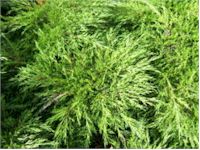|

Savin |
Savin, the Juniper Savin (Sabina), or Saffern, is a herb which grows freely in our bed of garden Simples, if properly cared for, and which possesses medicinal virtues of a potential nature. The shrub is a native of southern Europe, being a small evergreen plant, the twigs of which are densely covered with little leaves in four rows, having a strong, peculiar, unpleasant odor of turpentine, with a bitter, acrid, resinous taste. The young branchlets are collected for medicinal
use. They contain tannin, resin, a special volatile oil, and extractive matters.
|
A medicinal tincture (H.) is made from the fresh leaves, and the points of the shoots of the cultivated Savin. But this is a powerful medicine, and must be used with caution. In small doses of two or three drops with a tablespoonful of cold water it is of singular efficacy for arresting an active florid flux from the womb at the monthly times of women when occurring too profusely, the remedy being given every two, three, or four hours. Or from one to four grains of powdered
Savin may be taken instead of each dose of the tincture.
The stimulating virtues of Savin befit it for cleansing carbuncles, and for benefiting baldness. When mixed with honey it has removed freckles with success; the leaves, dried and powdered, serve, when applied, to dispel obstinate warty excrescences about the genitals.
Rubbed together with cerate, or lard, powdered Savin is used for maintaining the sores of blisters, and of issues, open when it is desired to keep up their derivative action.
The essential oil will stimulate the womb to functional activity when it is passively congested and torpid. As to its elementary composition this oil closely resembles the spirit of turpentine; and when given in small well diluted doses as a tincture (made of the oil mixed with spirit of wine), such medicine does good service in relieving rheumatic pains and swellings connected with impaired health of the womb. For these purposes the ordinary tincture (H.) of Savin should be
mixed, one part thereof with nine parts of spirit of wine, and given in doses of from six to ten drops with a tablespoonful of water. Dr. Pereira says about the herb: "According to my own observation, Savin is the most certain and powerful stimulator of the monthly courses in the whole of our "Materia Medica"; and I never saw any ill effects result from its administration." The essential oil may be preferred in a dose of from one to four drops on sugar, or in milk, when this
functional activity is sought.
Savin was known of old as the "Devil's Tree," and the "Magician's Cypress," because much affected by witches and sorcerers when working their spells.
Herb Simples
The Primitive Simplers presented here show the way of life in other generations, it is not suggested or recommended trying them yourself. |
|
Garden
Herbs
Home
History of Herbs
Herb Gardening
Herbs for Beginners
Drying & Preserving Herbs
Indoor Herb Gardening
Herb Garden
Hints & Tips
Herbal
Cooking
Herb Chart
Using Herbs
Culinary Herbs
Herb
Oil and Vinegar
Herb Teas
Herb Candy
Herb Jelly
Herb Simples
Preface
Introduction
Alphabetical Listing

Trade
Recipes Online
Share your Recipes with others!!
|


